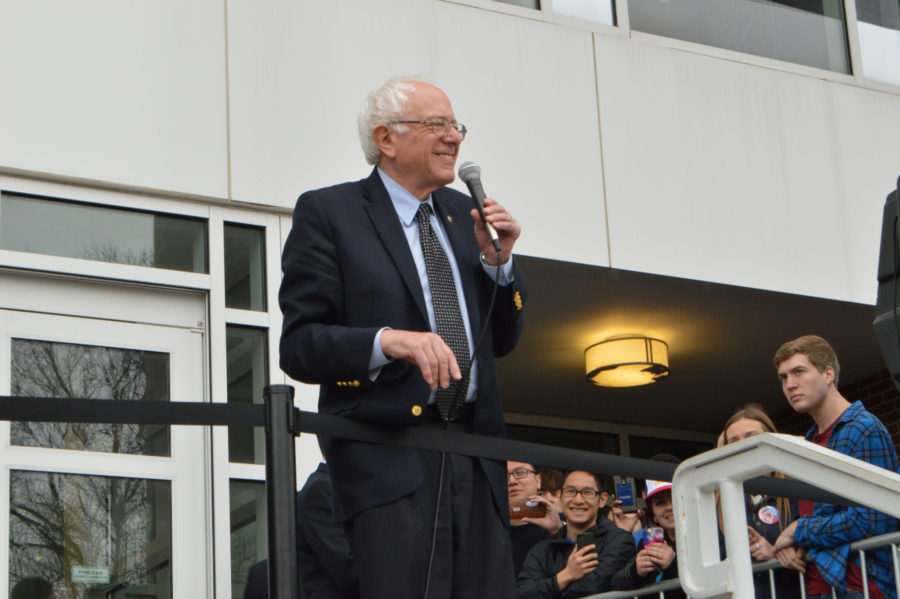Illinois primary results show power of millennial voting
Mar 16, 2016
The incomparable Kate McKinnon reprised her performance as Hillary Clinton for last week’s “Saturday Night Live” in a sketch that perfectly illustrates the importance of millennial voters in the 2016 presidential race.
Throughout the hilarious sketch, we watch as Clinton slowly morphs into Senator Bernie Sanders, all while making an effort to appeal to millennial voters.
The overall absurdity of the situation allows for some truly fantastic satire, such as when Clinton suggests that Sanders’ habit of railing against banks that are “too big to fail” is a “famous mobilizing sentence that works on you guys that I’ve been saying this whole time.”
Not only does McKinnon nail Sanders’ anti-Wall Street rhetoric and Brooklyn accent, the overall writing of the sketch successfully captures the influence that millennial voters hold in the upcoming election, including the group’s ability to shape the way the Democratic and Republican party align themselves in the future.
According to the Center for American Progress, there are currently 95 million millennials in the United States that will make up just shy of 40 percent of eligible voters. http://www.cnbc.com/2015/10/09/what-republicans-are-missing-about-millennial-voters.html
Get The Daily Illini in your inbox!
Hillary Clinton and Donald Trump emerged victorious Tuesday night in the Democratic and Republican presidential primaries, respectively.
Concrete numbers have yet to be released as to the specific breakdown of how many millennials cast their vote for each candidate; however, early voter tallies are suggesting that this Illinois primary is still historic.
Illinois early voter tallies from as late as Sunday night were 60 percent higher than early voter tallies in 2008, a historically active election season. http://www.bustle.com/articles/148230-how-many-people-voted-in-the-illinois-primary-the-prairie-state-was-a-close-race
Bernie Sanders dominated in Champaign county, home of the University, where he received 65.9 percent of the vote compared to 33.8 percent for Hillary Clinton. Demographics have not yet been released for the votes, but it’s likely that college voters were a significant part of Sanders’ dominance in the county. http://www.nytimes.com/elections/results/illinois
If this presidential election is encouraging more young people to vote, it would mark a positive change for the age group, which has often been noted as some of America’s most finicky voters.
Millennials are less likely than previous generations to identify with one party and then consistently remain loyal to it, which has been more common with previous generations.
In fact, a Pew Research Center survey found that about 51 percent of white millennials and 47 percent of non-white millennials consider themselves independent, meaning that they are much more likely to be swayed by the viewpoints of a specific candidate, not the ideologies of an overarching political party.
Such an unpredictable voting pool has caused significant challenges for members of both political parties. Clinton frequently receives flak for feeble attempts to make herself more relatable to the country’s youngest voters.
As inauthentic as her effort may seem at times, Clinton has a vested interest in gaining millennial support. According to a March poll from Rock the Vote and USA Today, 18-to 35-year-olds prefer Sanders to Clinton in the Democratic primary 54 percent to 37 percent. http://www.usatoday.com/story/news/politics/elections/2016/03/14/poll-millennials-clinton-sanders-trump-president/81612520/
Republican candidates are at an equally daunting disadvantage. Overall, 55 percent of millennial voters would like to see a Democrat in the White House, while only 40 percent would like to see a Republican.
Still, even with their clear political influence, millennials are notorious for their poor attendance at the polls. Sanders alluded to that during his campaign stop at the University on Saturday, suggesting that his campaign is most successful when millennials show up to vote in large numbers.
With such influence, and at such a critical time in our nation’s history, apathy from millennials when it comes to physically voting is disappointing. The results from Champaign county only further illustrate the power of political involvement among millennials;
Millennials are often labeled as being fond of “social media activism,” which entails sharing one’s political beliefs on Facebook or Twitter but then failing to actually go out and try and make a difference.
As we begin to inherit a world that has become increasingly dangerous and volatile, due to the shortcomings of those currently in charge, it is crucial now more than ever for us to make ourselves heard by voting in the elections.
Jessie is a junior in Media.






